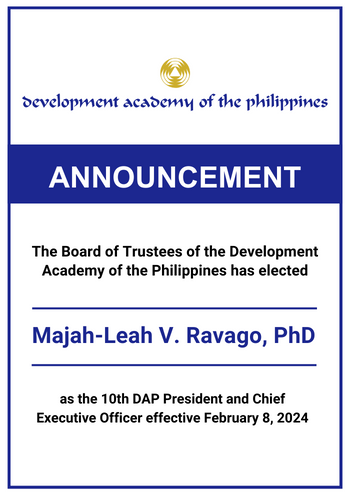The Development Academy of the Philippines (DAP), in partnership with the Department of Budget and Management, launched through its Government Quality Management Program a new project designed to improve government services and institutionalize service quality standards (SQS) in government frontline service. Dubbed as “Malasakit Para Sa Mamamayan” Project, the scheme aims to provide the basis for the institutionalization of SQS, which the project hopes will steer the bureaucracy towards a more “citizen-centered service delivery.”
The Academy formally launched the project by conducting the 1st Consultation Meeting in Developing Service Quality Standards for Frontline Government Services on 24 April 2018 at the DAP Building in Pasig City. The meeting was attended by representatives from various government agencies such as the Department of Budget and Management, Department of Agriculture, Department of Information and Communications Technology, Department of Foreign Affairs, Department of National Defense, Department of Science and Technology and some attached bureaus and agencies.
DAP Officer-In-Charge Magdalena L. Mendoza opened the program, stressing the significance of the “Malasakit Para sa Mamamayan” Project to the Philippine Development Plan 2017-2022. She believes that the success of the project will contribute to improving the quality of public services delivery.
Likewise, DAP Vice President and Productivity Development Center (PDC) Head Arnel D. Abanto shared some notable research results pertinent to frontline services based on the 2009 research project conducted by the DAP entitled “Development of Service Quality Standards Framework for the Public Frontline Service” while PDC’s Productivity Development Research Office Director Monica D. Saliendres laid the overview of the consultation meeting and emphasized the objectives and rationale of the project.
Abanto contended that citizens’ expectations must be accounted for in order for civil servants to have an idea of the quality of service that is expected from the government. He suggested some strategies to further support the study and help the project’s working group to gather data and information on those possible expectations from the people, like word-of-mouth communications, personal needs, past experience, and external communications.
Professor D. Brian Marson, co-founder and senior fellow of the Institute for Citizen-Centred Service in Canada, provided an in-depth discussion of the role of SQS in achieving high levels of client satisfaction with public sector services through video conferencing from Canada.
Professor Marson emphasized four items to achieve this: (1) choosing service standards based on the key drivers of client service satisfaction; (2) choosing specific service standards that reflect the service expectation of the majority of citizens and businesses; (3) training staff, implementing the service standards, and monitoring and reporting actual performance against SQS; and (4) monitoring and analyzing actual SQS performance data to identify the priority areas for service improvement.
Dr. Erniel B. Barrios, the project team leader, led the focus group discussion to elicit a list of common frontline services being offered, the usual clients as well as aspects or dimensions of services delivery in the government. The discussion also tackled incentives and sanctions that the frontline staffers are receiving for satisfied and dissatisfied citizens.
Organizers of the launching event felt that the activity could signal the beginning of a new journey to improve government services. They thus asked for the support and commitment of all the stakeholders of the project in order for it to attain its goals.




